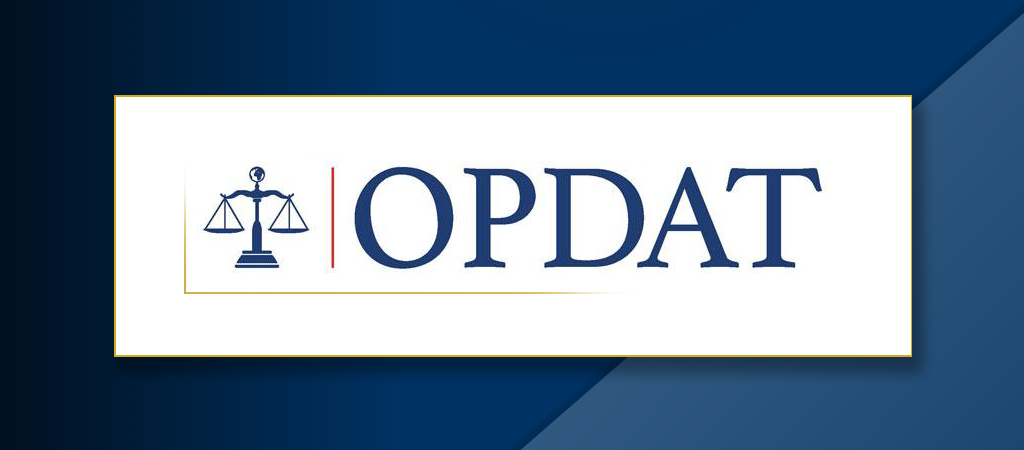Office of Overseas Prosecutorial Development, Assistance and Training (OPDAT)

Overseas Presence
- RLAs, ILAs, and ICHIPs stationed in partner nations lead bilateral and regional programs that build the operational skills needed to effectively combat transnational threats to the United States
Core Competencies
- Building complex cases
- Strengthening cross-border cooperation and information sharing
- Developing task forces
- Enabling interoperability with the U.S. justice system
- Technical advice and assistance to address priority threats including:
- Cartels and other transnational criminal organizations
- Terrorism and terrorist financing
- Human smuggling and trafficking
- Narcotics trafficking
- Corruption
- Money laundering
- Cybercrime
- Intellectual property rights violations
About
OPDAT was created in the Criminal Division of the Department of Justice in 1991 in response to the growing threat of transnational crime. OPDAT builds strong foreign partners who can work with the United States to enhance cooperation in transnational cases and to fight crime before it reaches our shores.
Leadership
Erik Peterson
Director
Marlon Cobar
Deputy Director
George Huber
Deputy Director
Ye-Ting Woo
Acting Deputy Director
Contact
202-514-1323
OPDAT was created in the Criminal Division of the Department of Justice in 1991 in response to the growing threat of transnational crime. OPDAT builds strong foreign partners who can work with the United States to enhance cooperation in transnational cases and to fight crime before it reaches our shores.
OPDAT has Resident Legal Advisors (RLAs), Intermittent Legal Advisors (ILAs), and International Computer Hacking and Intellectual Property Advisors (ICHIPs) posted around the world providing expert assistance and case-based guidance to foreign counterparts to combat transnational crime and terrorism in furtherance of U.S. national security.
OPDAT keeps Americans safe from violent crime by increasing partner nation skills to disrupt and dismantle transnational criminal organizations at the source. At the same time, OPDAT advisors develop relationships of trust with foreign counterparts to help them investigate and prosecute illegal migration, cartels, gangs, cybercrime, trafficking, terrorism, and other transnational crimes that harm Americans and American interests. OPDAT works closely with components throughout the Department of Justice, and partners globally with federal law enforcement agencies to advance America First priorities.
OPDAT’s programs are funded through interagency agreements between OPDAT and these United States Government partners:
- U.S.Department of State
- U.S. Department of War
OPDAT draws on USG and Department of Justice resources and expertise to enhance cooperation with foreign criminal justice sector institutions in transnational cases. OPDAT programs are designed to achieve tangible law enforcement and justice sector outcomes. Additionally, DOJ’s overseas operational and assistance engagements reinforce one another, consistent with U.S. national security objectives, so that the Department can use the full force of its authority and expertise to work with foreign governments in combating transnational crime and advancing security. Through OPDAT’s programs, partnerships are developed with foreign justice systems that achieve Trump Administration priorities.
The majority of OPDAT’s programs are implemented in country by Resident Legal Advisors (RLAs), who are experienced DOJ prosecutors attached to U.S. embassies for at least one year, typically longer. With the assistance of their Foreign Service National staff, they strengthen cooperation between host country justice institutions and the U.S. justice system. OPDAT also deploys Intermittent Legal Advisors (ILAs), DOJ prosecutors who are on targeted assignments of less than a year to help foreign partners who request expert assistance in specific cases impacting the United States.
Finally, OPDAT has developed a global network of International Computer Hacking and Intellectual Property Advisors (ICHIPs) to advise foreign counterparts on investigations, prosecutions, and cross-border cooperation against cyber and IP crimes. RLA, ILA, and ICHIP programs are overseen by Headquarters regional teams. At any given time, OPDAT has dozens of RLAs, ILAs, and ICHIPs in partner nations advancing America First policy.
In addition to programs in the field, OPDAT headquarters staff plan and execute programs in countries without an RLA, ILA, or ICHIP presence.
These programs include the Battlefield Evidence Initiative, which ensures that enemy material / battlefield evidence is available to prosecutors investigating and prosecuting foreign terrorist fighters and the Global Illicit Finance Rapid Response Fund, which builds cases with foreign partners seeking to investigate and prosecute the financing of criminal organizations that target American citizens.
OPDAT focuses on long-term, comprehensive, and sustainable cooperation with partner nations to keep Americans safe and ensure American prosperity. It accomplishes this mission through the development of sound legal frameworks that protect American interests and programming consistent with the President’s foreign policy. OPDAT programs are focused and results driven. They are tailored to host country legal infrastructures and interoperability with the U.S. justice system. OPDAT coordinates these efforts with the U.S. interagency and international partners.
OPDAT enjoys unique access to some of the most experienced criminal justice experts in the nation. The Department of Justice, with over 5,000 Assistant U.S. Attorneys and over 600 Criminal Division attorneys, provides a primary source of expertise. Depending on U.S. priorities in each host country, OPDAT also coordinates with other Department of Justice components, including the National Security Division; ATF; DEA; FBI; and U.S. Marshals Service. In addition, OPDAT can utilize the expertise of other federal departments, such as Treasury and Homeland Security, as well as state and local prosecutors’ offices. OPDAT also coordinates with U.S. judges and related organizations.

 U.S. Department
of Justice
U.S. Department
of Justice
